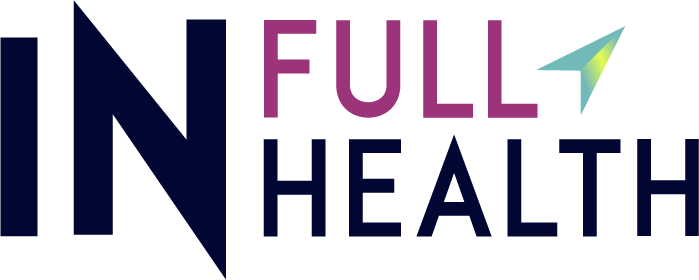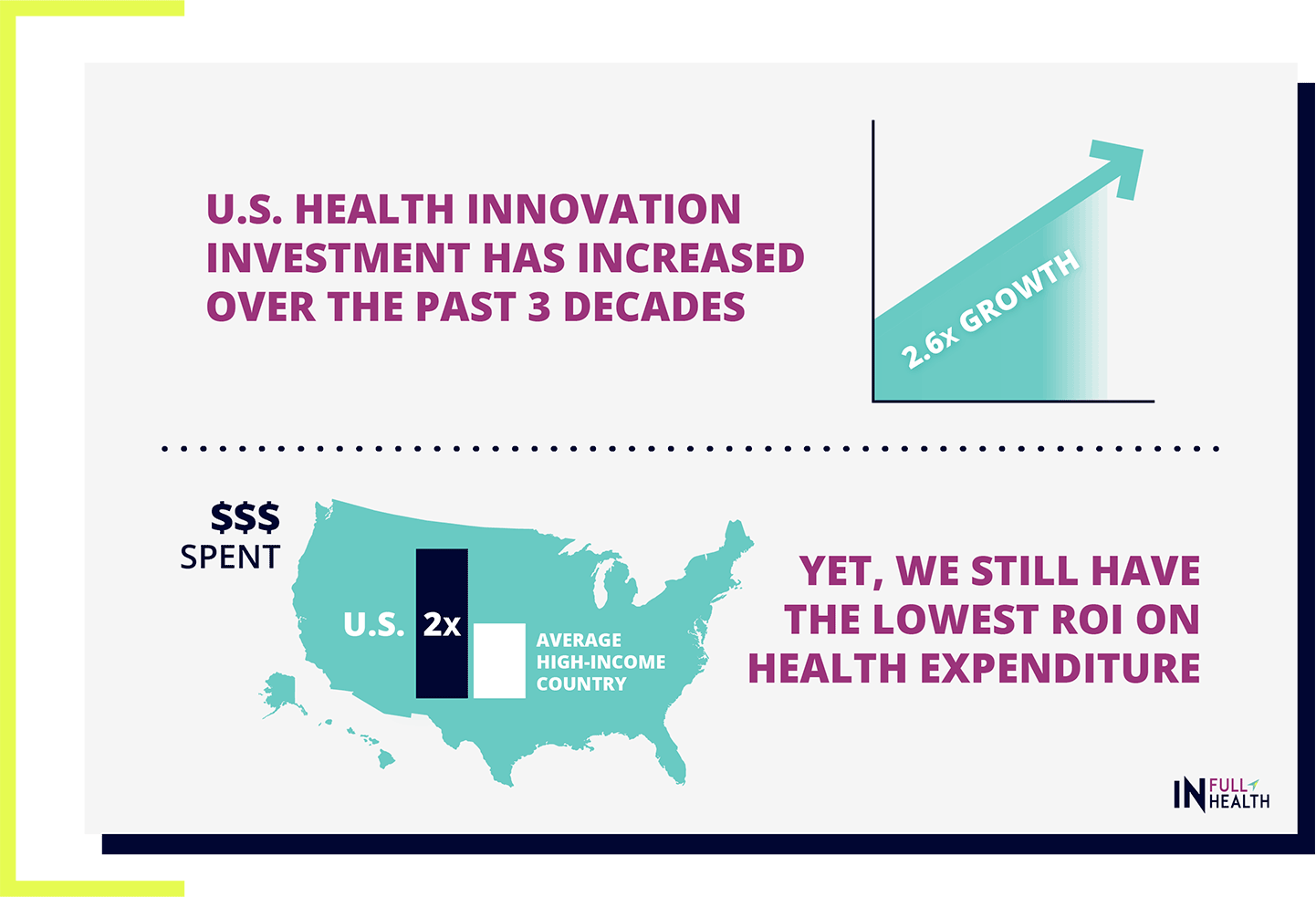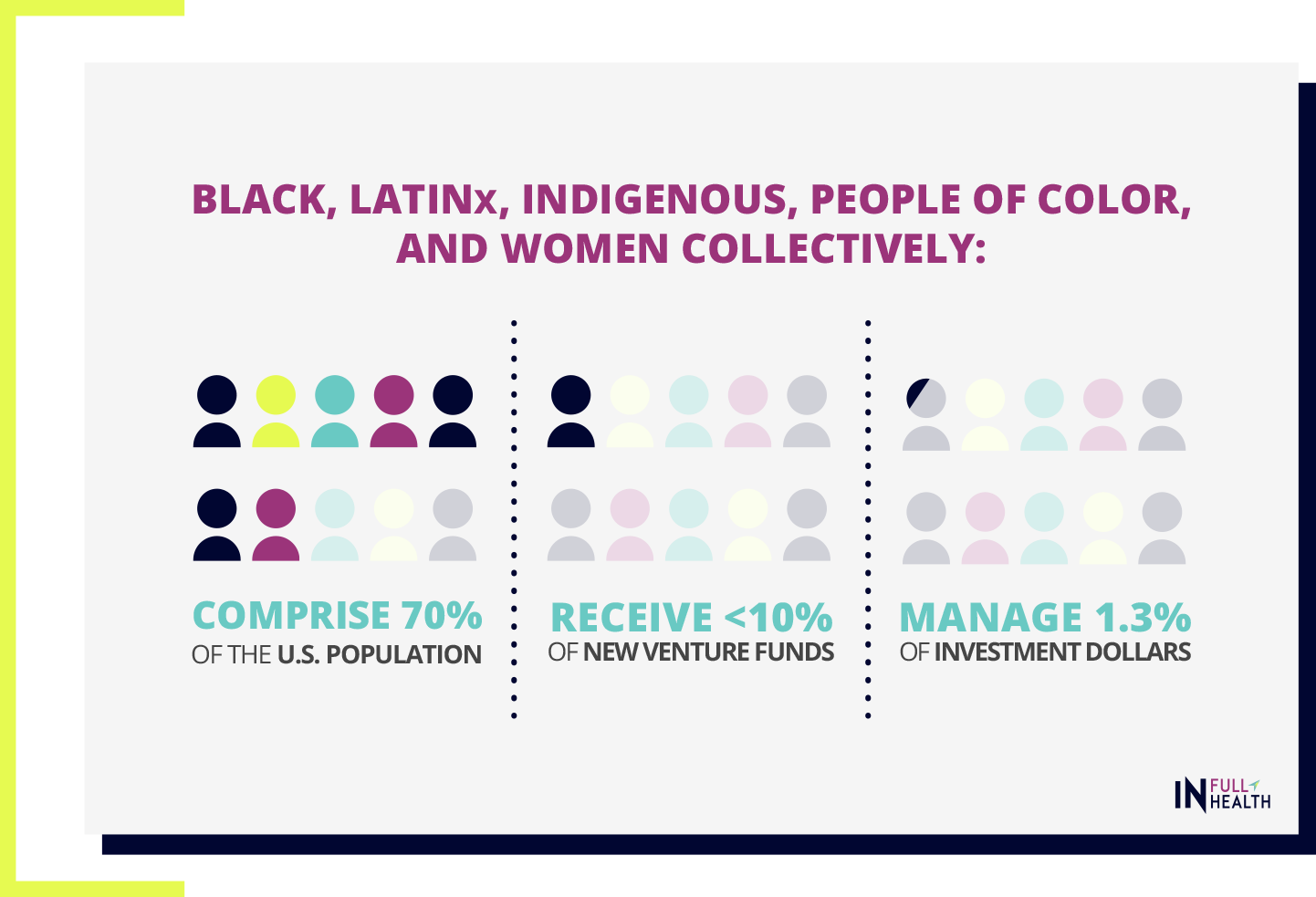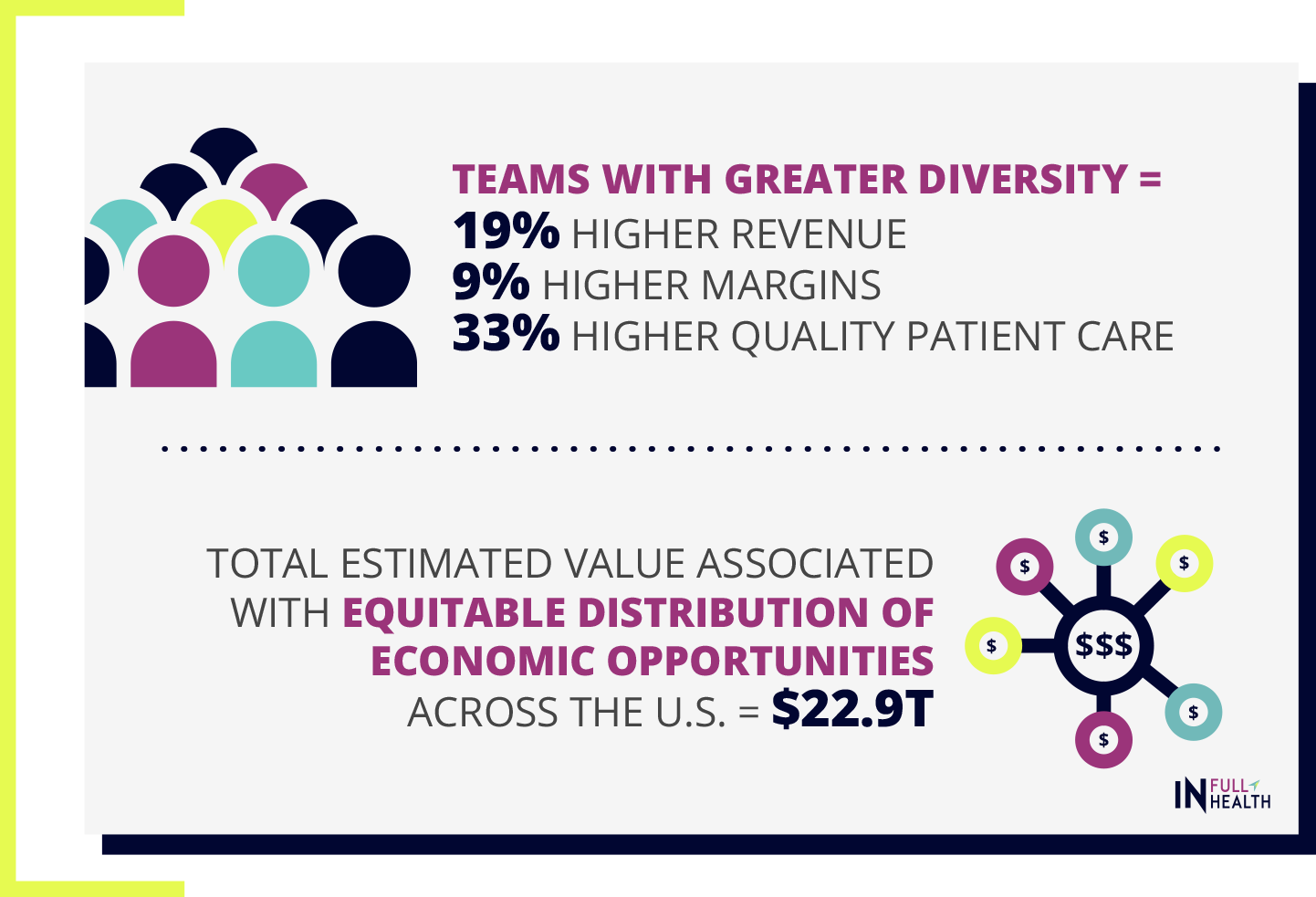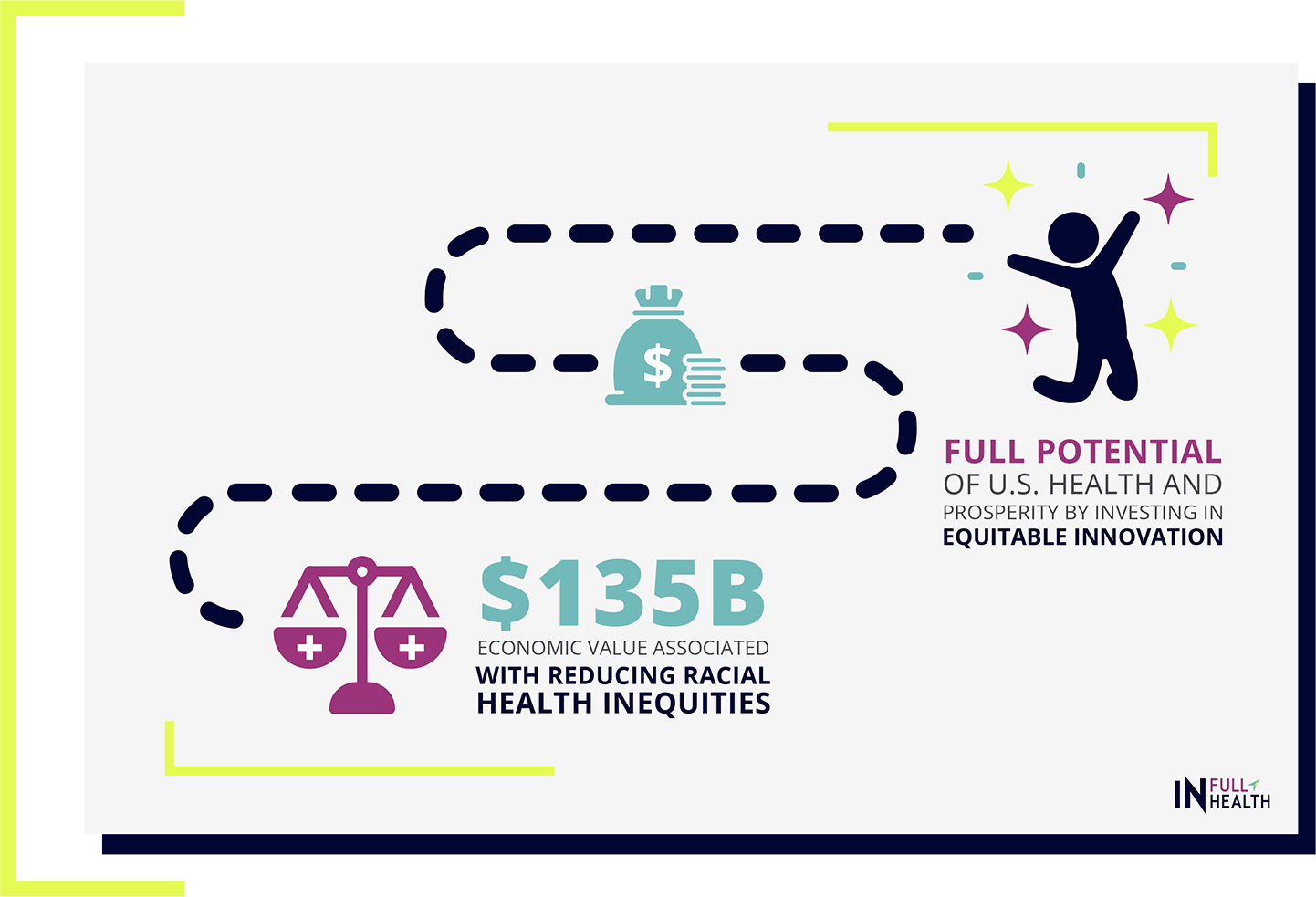
Business Case for Change in U.S. Health Innovation Resourcing
A just and equitable society is one in which every person has the resources and opportunities to be healthy and well. Stakeholders in the health industry share a moral and ethical obligation to ensure health equity. We also share an opportunity. By investing in full health for all, our nation stands to flourish and prosper.
Despite decades of increasing investment in health innovation, the U.S. continues to experience worse health than other high-income nations and persistent inequity.
- U.S. expenditure on medical and health research and development in 2018 was over $194B1, representing 2.6x growth in spending as a % of GDP over the past 30 years2. Health care venture capital, which comprises a significant and highly visible fraction of total investment in new businesses3, saw 900% growth in annual venture funds raised over the past ten years and over $43B in capital invested in 2020 alone4.
- The U.S. spends the most money on health care, at almost 2x the rate per capita of the average high-income country, yet continues to be in the worst health of all high-income countries, with the lowest life expectancy, highest chronic disease burden, highest suicide rate, and highest rate of avoidable death5.
- Further, Black, Latinx, Indigenous, and other communities of color; women; LGBTQ+ people; people with disabilities; people with low income; and those living at the intersection of communities historically marginalized by the health care system experience even worse health outcomes below these dismal national benchmarks6,7,8.
As the country continues to shift to value-based payment, the business imperative to advance equity in population health grows stronger.
- In addition to benefiting patients and communities, the provision of more equitable health care stands to improve value for those responsible for payment – whether consumers paying out-of-pocket, public or employer-sponsored health plans paying fee-for-service, or participating in value-based payment models.
- In 2018, a historical high of 35.8% of U.S. health care payments were tied to value – impacting approximately 226.5M people or 77% of the covered population. And 91% of public and private payers anticipated continued growth in value-based payment9.
- As a result, policymakers, payers, and employer sponsors are increasingly demanding solutions that equitably improve health across their populations — including via an important call to bring equity into an expanded quintuple aim.10
- Demonstrating impact on the health of populations who have been historically marginalized and underserved can be a source of competitive differentiation.
The exclusion of the majority of the U.S. population from health innovation resourcing is preventing meaningful progress in national health improvement.
- Black, Latinx, Indigenous, People of Color, and women comprise approximately 70% of our population11 and hold an estimated 80% of purchasing power12 but are underrepresented in health solution investment, development, and purchasing decisions. They collectively manage just 1.3% of the $6.9 trillion of assets in the investment industry13, receive less than 10% of funding for new ventures14 15, and hold fewer than 43% of senior leadership roles in the health care industry16.
- The resulting market of health care products and services is failing to drive a meaningful improvement in our national health outcomes, and especially in meeting the needs of Black, Latinx, Indigenous, communities of color, women, LGBTQ+, people with disabilities, people with low income, and those living at the intersection of excluded identities. Many solutions exacerbate inequitable access and/or perpetuate poor quality of health care due to bias inherent in exclusionary design17 18.
The benefits of inclusive and equitable decision-making and resource allocation on financial performance and solution impact are well documented.
- Robust and statistically significant evidence demonstrate stronger financial performance of companies led by diverse teams, including 19% higher revenue and 9% higher margins from innovation efforts19 and 33% greater likelihood of above-average company profitability20 — and higher quality of patient care and financial performance in the health care industry specifically21.
- While many investors have access to data supporting these advantages, current capital allocation demonstrates a persistent gap between knowledge and action. 88% of venture capitalists say they believe that the lived experience of underrepresented entrepreneurs is a competitive advantage in identifying problems to be solved and markets to be addressed. And 86% say they agree that investing in more women and entrepreneurs of color would benefit their fund and their limited partners22.
- Inequitable distribution of economic opportunities by race and ethnicity is estimated to have suppressed $22.9T in total value over the past 30 years — a tremendous opportunity to increase the size of the total “U.S. economic pie”.23
By investing in solutions created for, with, and by communities who have been sidelined from health innovation resourcing, including Black, Indigenous, People of Color, women, LGBTQ+, people with disabilities, people with low income, and those living at the intersection of historically marginalized identities, the U.S. stands to make measurable progress in national health and economic prosperity.
- Total economic gain associated with reducing racial health inequities within the U.S. population is estimated to be $135B per year24. Investment in solutions focused on eliminating those inequities is a good place to start.
- If we hope to improve the health of our nation and realize the economic benefits of equitable resource allocation, we must aim much higher than merely closing gaps — we must invest in a radical reimagination of health and wellbeing led by those who have been under-resourced and excluded.
Stay Connected
with our In Full Health Community and receive regular updates on opportunities and resources for learning and action.

In Full Health is a community committed to advancing equitable opportunities in health innovation investment, solution development, and purchasing.

